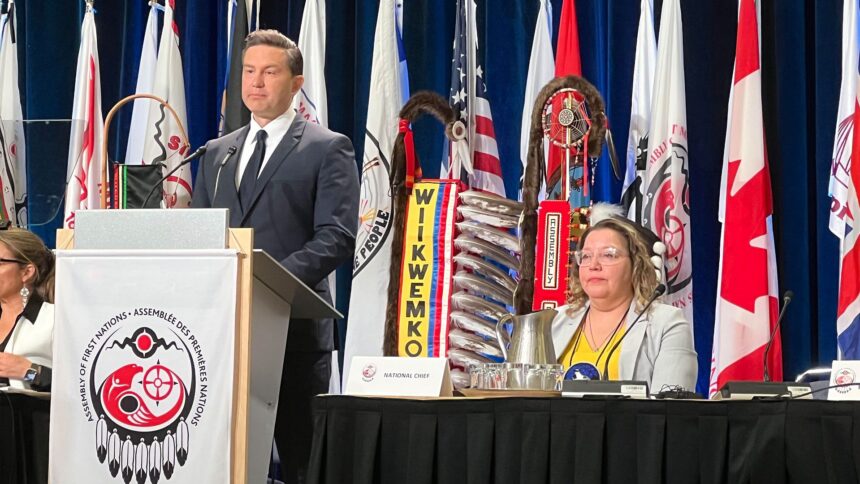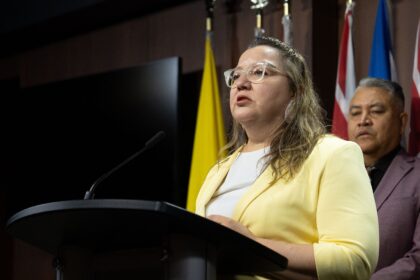Conservative Leader Pierre Poilievre joined chiefs on a virtual call Tuesday as part of the Assembly of First Nations’ (AFN) virtual forum series with federal party leaders. Poilievre has made efforts in recent years to connect with First Nations communities, particularly those advancing economic development and has visited several communities, promoted policy discussions and posted related videos to his YouTube channel. He has praised ideas proposed by Manny Jules, chief commissioner of the First Nations Tax Commission from Tk’emlúps te Secwépemc and met with chiefs in British Columbia last year to discuss economic planning. The forum was a chance for Chiefs to push the leader on other topics. As with the Green party co-leaders, who attended a similar forum last week, five questions were submitted by the AFN to Poilievre in advance. Additional questions were submitted by chiefs through a live chat and read aloud by a moderator. While the Conservative platform has largely focused on resource extraction and economic development, the forum broadened the discussion. On the topic of water, Poilievre expressed disappointment that Bill C-6, which would have provided funding for First Nations to establish minimum water standards, died on the order table when former prime minister Justin Trudeau prorogued Parliament. He said he would support Indigenous policing for communities that wish to replace the RCMP. In his opening remarks, Poilievre acknowledged the harm and intergenerational trauma caused by residential schools. The topic remains sensitive for the Conservative Party as past comments Poilievre made on the radio—just before former prime minister Stephen Harper’s apology on June 11, 2008—have resurfaced on social media this election. Poilievre apologized for those remarks shortly after making them. During the forum, he was also asked about his continued support for British Columbia candidate Aaron Gunn, who has been criticized for posts suggesting the residential school system did not constitute genocide. “I have sought clarification, and Mr. Gunn does acknowledge the atrocity of residential schools and the very real and harmful impacts they have had,” answered Poilievre. Chiefs also pressed Poilievre on the United Nations Declaration on the Rights of Indigenous Peoples (UNDRIP) and the meaning of free, prior, and informed consent. Poilievre expressed discomfort with the legislation due to its ambiguity. “ What does UNDRIP mean about free, prior and informed? Does it mean that the majority of elected leadership do not get a chance to proceed with a project that’s going to bring them immense benefits? I don’t think that it does and or should,” he said. “I think that in cases where you have overwhelming support by First Nations, but it’s not unanimous, I think projects should still go ahead.” Poilievre used the forum to further explain Conservative Indigenous policy, including a plan for First Nations to derive tax revenue directly through a proposed First Nation resource charge. “I think this will be groundbreaking because not only will it allow companies to pay their share of their federal corporate tax to the First Nation, it will also come with a very simple template,” he said. He also proposed creating an infrastructure institute, an idea proposed by Manny Jules, to provide communities with stable revenue for essential services. “Infrastructure is falling apart and housing is disintegrating. We need a predictable flow of revenue that can allow communities to monetize it, make major capital investments upfront, knowing that they’ll be able to make the mortgage payments on those investments over the years ahead and participate in the real economy,” said Poilievre. The Conservative Party also released its platform Monday. Key pledges related to First Nations include: Doubling the 1st Patrol Group of the Canadian Rangers from 2,000 to 4,000 members Acquiring two additional Polar Icebreakers for the Royal Canadian Navy Building Canada’s first permanent Arctic military base since the Cold War: CFB Iqaluit Green-lighting all federal permits for the Ring of Fire project in northern Ontario Committing $1 billion over three years to build a road connecting First Nations and mineral deposits to the Ontario highway network Additional commitments include creating a new offence of “assault of an intimate partner” to impose tougher sentences, and funding “life saving drug treatment” for 50,000 people to help them recover from addiction. The next AFN forum will feature NDP Leader Jagmeet Singh on April 23 from 3 p.m. to 4:30 p.m. ET. Liberal Leader Mark Carney has not yet confirmed his participation. Read More: Decision 2025 Continue Reading
Poilievre meets virtually with AFN chiefs, faces questions on water, policing, UNDRIP

Leave a Comment









